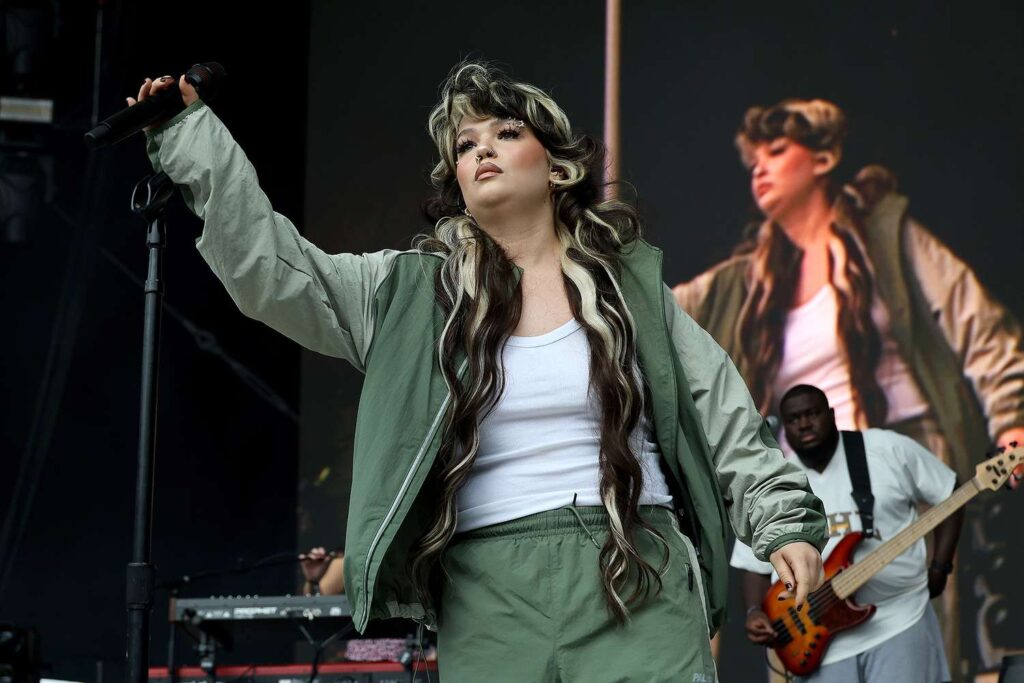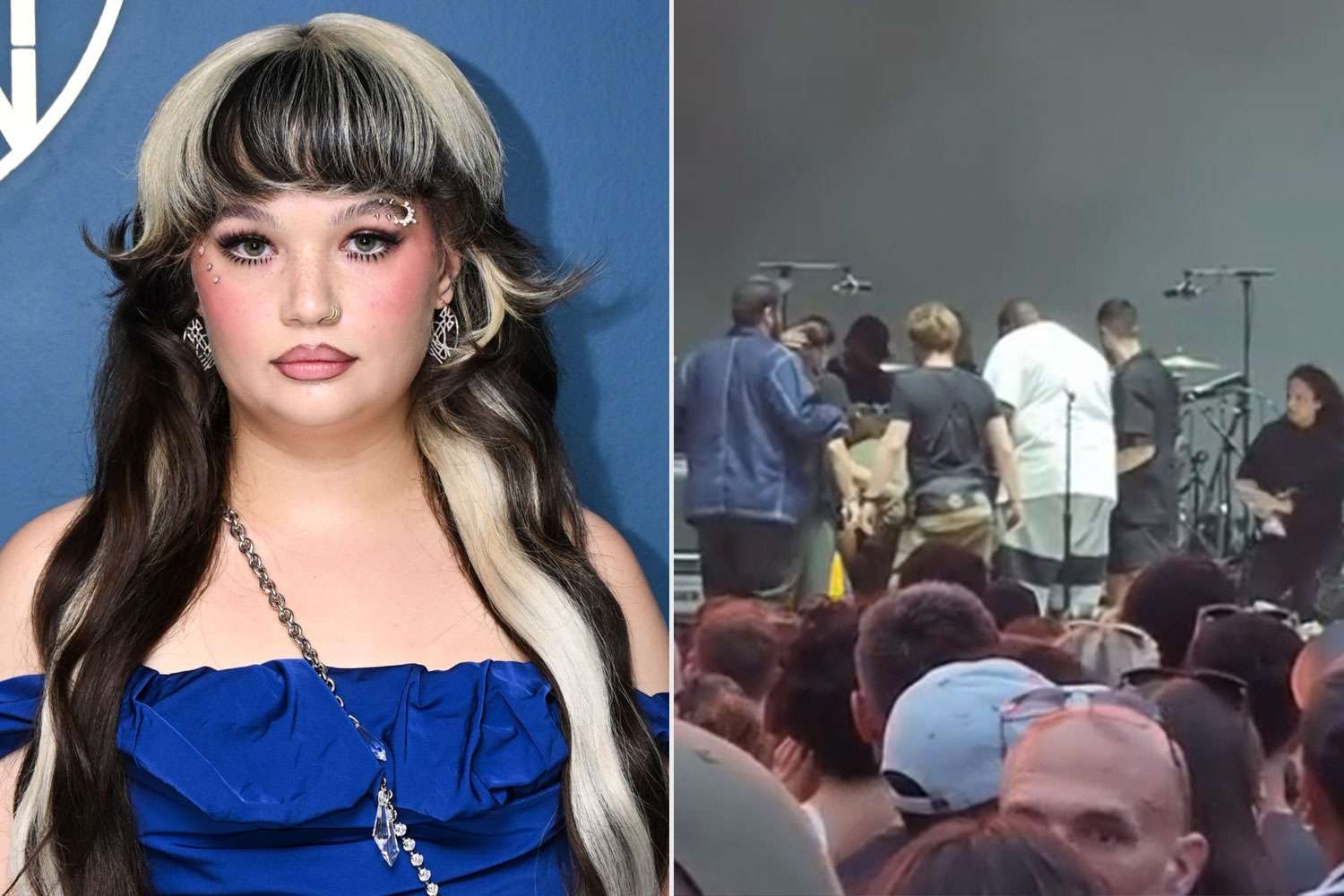When Lola Young took the stage at the All Things Go music festival in New York on September 27, fans expected the same powerful voice and fearless energy that has made her one of the most promising young artists of her generation. At just 24 years old, she has already developed a reputation for raw, unfiltered honesty in her music and a stage presence that commands attention. But what happened during her set that night was far from the performance anyone had anticipated. As she sang her track “Conceited,” the moment shifted from celebration to concern. In video clips shared widely across social media, Young suddenly lost her footing and collapsed backward onstage. The music cut out, her team rushed to her side, and the stunned crowd was left silent, trying to make sense of what had just happened.
For her fans, the incident was deeply worrying, but it didn’t take long for the singer to address the situation herself. Later that day, Young shared a short but heartfelt message through her Instagram Stories, reassuring those who had witnessed the frightening scene that she was recovering. “For anyone who saw my set at All Things Go today, I am doing okay now,” she wrote. “Thank you for all of your support.” While brief, the message carried a wave of relief for her supporters, who had already begun flooding social media with their concern.
What stood out about the evening, however, was not just the collapse itself but the moments that preceded it. Before she faltered, Young had been candid with the audience about what she had been going through in the days leading up to the festival. She described her appearance at All Things Go as a “beautiful experience” that came after what she called a “tricky couple of days.” Her words were laced with a vulnerability that fans have come to recognize not just in her music but in the way she addresses her struggles openly. “Sometimes, life can really make you feel like you can’t continue,” she told the crowd, a sentiment that struck many as both heartbreaking and deeply relatable. “But you know what? Today, I woke up and I made the decision to come here. I wanted to perform, and I don’t want to wallow in my sadness.”
That determination—to show up despite hardship, to give what she could to her audience—spoke volumes about her dedication as an artist. Yet it also revealed just how much weight she was carrying in that moment. Only a day earlier, on September 26, she had canceled her scheduled performance at the We Can Survive concert in New Jersey, an event centered around mental health awareness and suicide prevention. At the time, her manager, Nick Shymansky, released a message explaining the cancellation. He said that while Young is very open about her mental health journey, there are times when he and her team have to intervene and make difficult decisions to protect her well-being. His words painted a picture of a team that cares deeply for her safety but also of an artist grappling with challenges that don’t always allow her to fulfill the demanding pace of a rising star’s career.
Following her collapse at All Things Go, Young made the tough decision to withdraw from the festival’s Maryland date on September 28. In another Instagram post, she expressed her regret to fans while also reminding them of her humanity. “I love this job and I never take my commitments and audience for granted so I’m sorry to those who will be disappointed by this,” she wrote. “I hope you’ll all give me another chance in the future. Thank you to all those who listen and care. To all the people that love to be mean online, pls give me a day off.” It was a simple yet powerful request, reflecting the pressures that public figures often face, especially young women navigating fame in the age of social media.
Young’s openness about her struggles is not new. Over the past several years, she has consistently used her platform to shed light on her mental health, particularly after revealing that she had been diagnosed with schizoaffective disorder. According to the Mayo Clinic, this condition is defined by a combination of schizophrenia symptoms, such as hallucinations and delusions, along with mood disorder symptoms, which can include episodes of depression or mania. It is a diagnosis that carries both stigma and misunderstanding, but Young has chosen to speak about it candidly. In 2022, she shared a post explaining that she sometimes struggled to even find the words to describe the impact her diagnosis had on her life. “I have struggled immensely learning to accept this part of myself, and I am still learning,” she wrote. Yet she also framed her condition as something that gave her strength rather than diminished her. “I am human and I am, like everyone, capable of incredible things, my mental health condition does not define me. It is my superpower.”
That framing—the idea of struggle as a source of empowerment—runs through much of her artistry. Her breakout song “Messy,” which became a defining track off her 2024 album This Wasn’t Meant for You Anyway, resonated with listeners not just for its sonic edge but for its emotional rawness. The project cemented her as an artist who wasn’t afraid to confront discomfort, whether her own or society’s, and turn it into music that spoke to an entire generation dealing with its own mental health challenges.
Her career trajectory over the past year has been meteoric. In April, she took the stage at the Coachella Valley Music and Arts Festival, a coveted platform for any rising star. Just a few months later, she was featured on the Extended Play Stage at the MTV Video Music Awards, further solidifying her status as an artist to watch. She recently appeared on Late Night with Seth Meyers, where she shared insights about her journey and artistry with her signature mix of wit and honesty. All of this success has come quickly, and with it, the kind of attention and scrutiny that can overwhelm even the most seasoned performers. For someone like Young, whose art is so closely tied to her lived experience and vulnerability, the weight of expectation can be a double-edged sword.

The collapse at All Things Go therefore felt like a painful reminder that behind the music, the awards nominations, and the viral performances, there is a young woman still learning how to balance her dreams with her health. The honesty she shared onstage—speaking about making a conscious decision to perform despite her sadness—revealed the emotional push and pull of wanting to show up for fans while also confronting the reality of her struggles.
What has made Young’s story resonate so widely is not just the drama of an onstage collapse but the broader conversation it has sparked about mental health in the music industry. More and more, artists are beginning to speak up about the toll of fame, touring, and constant pressure. Figures like Selena Gomez, Demi Lovato, and Shawn Mendes have all paused or canceled shows due to their own mental health battles, normalizing a conversation that was once avoided. Young’s recent experiences add her name to this growing list of artists who are bravely putting their well-being ahead of career demands, even when it disappoints audiences in the short term.
For fans, there has been an outpouring of support since the incident. Social media has been filled with messages of encouragement, with many people praising her transparency and urging her to take whatever time she needs. Others have reflected on her music and how much it has helped them through their own struggles, reinforcing the idea that her vulnerability onstage and online has built a community that extends far beyond typical fandom. It is a reminder of the profound connection between artist and listener, one that is forged not only through songs but through shared experiences of pain, resilience, and growth.
At the same time, Young’s post about online cruelty highlighted another reality of living in the public eye: the constant stream of criticism and negativity that can come with it. Her request for “a day off” from mean comments underscored just how relentless the scrutiny can be, particularly when she is already dealing with personal hardship. For many, her words were a stark reminder that celebrities are not immune to the impact of digital cruelty. In fact, because of their visibility, they often bear the brunt of it more intensely.
As Young continues to recover, what lies ahead for her career remains both uncertain and full of promise. She has proven that she has the talent, the vision, and the resilience to become one of the defining voices of her generation. But perhaps more importantly, she has also demonstrated a courage that transcends the stage—the courage to be open about her struggles, to set boundaries when necessary, and to demand compassion in a world that often forgets its importance.
The collapse at All Things Go will likely be remembered as one of those moments that marked a turning point, not just for her personally but for her broader story as an artist. It brought attention to her humanity, reminding everyone that behind the songs and performances is someone still navigating life’s challenges. It reminded fans of the stakes involved when artists push themselves to deliver despite personal difficulties, and it emphasized the need for empathy in how we engage with them.
For Lola Young, the path forward may involve rest, reflection, and reimagining how she wants to move through the world as both a person and an artist. Whatever comes next, the outpouring of support she has received shows that her audience is willing to wait, willing to listen, and willing to embrace her not only at her highest moments but also in her most vulnerable ones. That, perhaps, is the true measure of her impact—not just the songs she has sung or the stages she has conquered, but the way she has made people feel seen in their own struggles by being brave enough to share hers.

At only 24, Lola Young has already faced challenges that would overwhelm many. Yet she continues to rise, continues to sing, and continues to remind the world that vulnerability is not weakness—it is strength. Her recent experiences may have forced her to step back temporarily, but they have also deepened the conversation around mental health, artistry, and the pressures of fame. In the end, her story is one of resilience, and the message she leaves is clear: she is human, she is still learning, and she is not defined by her struggles. Instead, she turns them into her superpower, and in doing so, inspires countless others to believe that they can, too.
